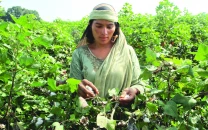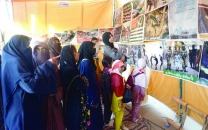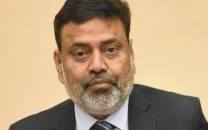‘Disaster resilient health infrastructure needed’
Speakers at University of Karachi seminar underline importance for improving disaster predictability

The floods of 2022 have forced the policymakers to revise the priorities for response to natural calamities, top official of disaster risk management said on Monday.
The National Disaster Risk Management Fund (NDRMF), Islamabad, CEO Dr Bilal Anwar said that floods in 2022 had emphasized the importance of disaster resilience health infrastructure for the country, as there was a dramatic shift in the priorities of people soon after a disaster and the health care services became the second most top priority after food.
One of the major priorities in post-disaster response is an urgent delivery of lifesaving and livelihood assistance in most affected areas in line with their needs, the NDRMF Chief said.
He was addressing a one-day hybrid seminar on "Building Climate Resilient Healthcare Infrastructure: Post Disasters Scenario in Pakistan" held at the Dr Panjwani Center for Molecular Medicine and Drug Research (PCMD), University of Karachi, on Monday.
The seminar was also addressed by Prof Dr Michael Patterson, Auckland University of Technology (AUT), New Zealand, Prof Dr Mohammad Wasay, Secretary PAS Karachi Chapter, Dr Hideyuki Shiroshita, the Founding President of Avoidable Deaths Network, Prof Dr Nibedita S. Ray Bennett, Associate Professor in Risk Management, University of Leicester, UK, Prof Dr Ghazna Khalid, Technocrat, Social Activist and Gynecologist, and Dr Nimra Iqbal of Avoidable Deaths Network.
The seminar was jointly organized by Dr Panjwani Center for Molecular Medicine and Drug Research, the Pakistan Academy of Sciences (PAS), the Avoidable Deaths Network (ADN), and UK, Sindh Innovation Research Educational Network (SIREN).
Dr Bilal Anwer said that the disaster imposed multiple pressures on the health system and caused disruption for providing health services to people. He said, "As many as 6.3 million people affected by floods lost their household sanitation facilities while 4.7 million affected persons are not practicing handwashing with soap at critical times due to lack of facilities and limited awareness."
In connection with the health support activities, NDRMF has provided a grant of $50 Million during the Covid-19 Pandemic for the procurement of first of vaccine and personal protective equipment (PPE), he said.
Prof Mohammad Wasay underlined the importance for improving disaster predictability and preparation for the disasters coming in future. He said, "The UN reports an estimated 1,700 people have lost their lives, a third of them children, and 12,800 have been injured, while half a million-flood displaced are living in relief camps; largely in Sind."
The UN children's agency said more than three million children were in need of humanitarian assistance and stood at heightened risk of diseases, drowning and malnutrition due to the most severe flooding in Pakistan's recent history, he said.
Over 15,000 cases of skin infection cases, around 14,000 cases of diarrheal diseases and more than 13,000 cases of acute respiratory illnesses are being reported daily at government-run medical camps, he said.
Prof Wasay said that more than 3 million people were still displaced, while half a million were in relief camps, supported by provincial governments, PDMAs, and NGOs.
Prof Michael Patterson said that climate change was the main challenge for Pakistan, which is the country of the Indus River that is a large-scale huge powerful river system. This is the nature of rivers to flood, whereas Pakistan is experiencing the worst flood ever, he mentioned.
Prof Nibedita S. Ray Bennett talked about her research themes, and said that disaster education, maternal mortality and morbidity from an unsafe abortion and post-abortion complications during disasters and crises, direct and indirect disaster deaths, snakebites deaths during disasters, and lightning deaths are the major research themes. Dr Hideyuki Shiroshita presented a brief introduction of Avoidable Deaths Network (AND).
Published in The Express Tribune, October 18th, 2022.



















COMMENTS
Comments are moderated and generally will be posted if they are on-topic and not abusive.
For more information, please see our Comments FAQ